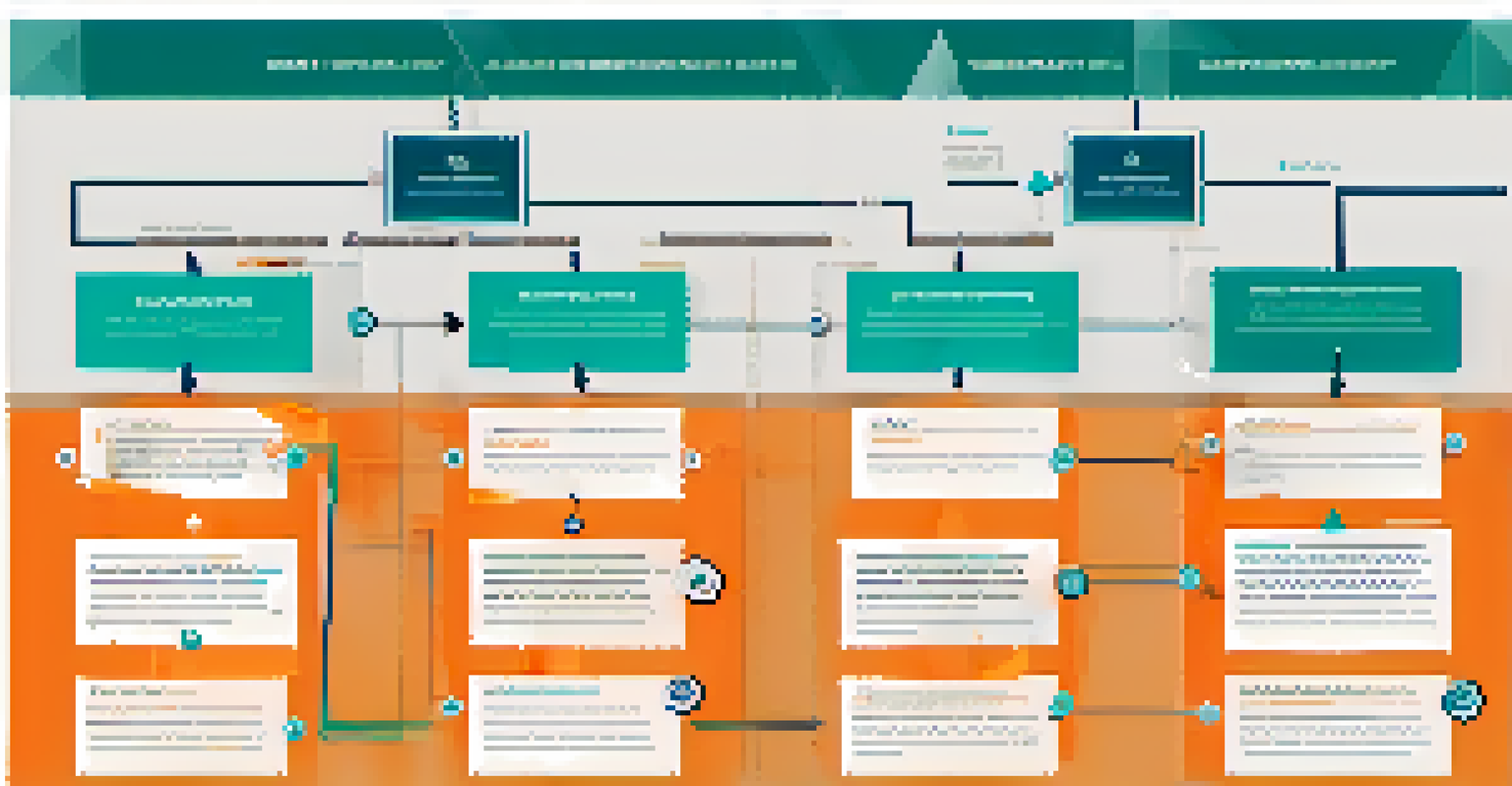Smart Contracts in Decentralized Insurance: A Game Changer

Understanding Smart Contracts in Insurance
Smart contracts are self-executing agreements with the terms directly written into code. In the context of insurance, they automate policy execution and claims processing, eliminating the need for intermediaries. This technology allows for greater transparency and efficiency, as all parties can access the contract's terms in real-time.
Smart contracts are the digital equivalent of traditional contracts, but with built-in enforcement mechanisms that make them more efficient and less prone to human error.
Imagine a situation where you file a claim after a car accident. Traditionally, this process can take weeks, with back-and-forth communication and paperwork. With smart contracts, the claim can be verified and processed instantly, simplifying the experience for everyone involved.
Essentially, smart contracts serve as the backbone for decentralized insurance, offering a streamlined approach that can enhance trust among participants. They are not just a trend; they represent a significant shift in how insurance can operate in a digital age.
Benefits of Decentralization in Insurance
Decentralization means removing the middleman, which can significantly reduce costs for both insurers and policyholders. By leveraging blockchain technology, decentralized insurance models eliminate many administrative overheads. This results in lower premiums and more competitive pricing for consumers.

Additionally, decentralization increases security and reduces the risk of fraud. With transactions recorded on a blockchain, they become immutable and transparent, making it much harder for fraudulent claims to go unnoticed. This added security can foster greater trust in the insurance system as a whole.
Smart Contracts Enhance Efficiency
Smart contracts automate insurance processes, significantly speeding up claims and improving overall efficiency.
Moreover, decentralized insurance can reach underserved markets where traditional insurance models may not be viable. By removing barriers, these solutions can provide coverage to individuals who previously had no options, thus promoting financial inclusion.
How Smart Contracts Improve Claims Processing
Claims processing is often cited as one of the most cumbersome aspects of traditional insurance. Smart contracts can revolutionize this by automating verification and payout processes. For example, if a flight is delayed, a smart contract can automatically trigger compensation without any manual intervention.
The future of insurance is decentralized, where technology empowers individuals and reduces the need for intermediaries.
This automation not only speeds up claims but also enhances accuracy. With predefined conditions coded into the contract, there is less room for human error or misinterpretation of policy terms. This leads to quicker resolutions and happier customers, which is vital in the service industry.
Furthermore, the transparency of the blockchain ensures that all parties can track the status of a claim in real-time. This accountability reduces disputes and builds trust, as policyholders can see exactly how their claims are being handled.
Real-World Examples of Decentralized Insurance
Several companies are already implementing smart contracts in their insurance offerings. For instance, Etherisc is a platform that allows users to create decentralized insurance products, using smart contracts to provide coverage for flight delays or natural disasters. This innovative approach illustrates the practical application of the technology.
Another notable example is Nexus Mutual, which uses blockchain to cover smart contract failures, providing a safety net for users in the decentralized finance (DeFi) space. The use of smart contracts here ensures that claims are processed automatically based on the conditions set within the contract.
Decentralization Reduces Costs
Decentralized insurance models cut out intermediaries, resulting in lower premiums and increased security for policyholders.
These real-world applications not only demonstrate the viability of smart contracts in insurance but also inspire more companies to explore similar models. As the industry evolves, more examples will likely emerge, showcasing the benefits of this technology.
Challenges Facing Smart Contracts in Insurance
Despite their potential, smart contracts in the insurance sector face several challenges. One of the primary concerns is the legal recognition of these digital agreements. Since smart contracts are relatively new, regulatory frameworks are still catching up, which can create uncertainty for both insurers and policyholders.
Moreover, technical issues can arise, such as bugs in the code or vulnerabilities that could be exploited. Ensuring that smart contracts are secure and reliable is paramount, as any flaws could lead to significant financial losses for users. Therefore, thorough testing and auditing of contracts are essential before deployment.
Additionally, user education is crucial. Many potential users may not fully understand how smart contracts work or their benefits. Creating awareness and providing clear information can help overcome these hurdles, paving the way for wider adoption in the industry.
The Future of Insurance with Smart Contracts
The future of insurance is likely to be heavily influenced by the continued integration of smart contracts. As technology advances, we can expect more refined and user-friendly solutions that cater to the needs of consumers. This shift could lead to more personalized insurance products tailored to individual circumstances.
Furthermore, the growth of decentralized finance (DeFi) could create new opportunities for insurance providers. By collaborating with DeFi platforms, insurers can offer unique products that leverage smart contracts to enhance user experience and accessibility.
Future Growth in Insurance Tech
The future of insurance will increasingly rely on smart contracts, leading to more personalized and accessible products.
Ultimately, the increasing adoption of smart contracts in insurance could result in a more efficient, transparent, and fair system. As the industry embraces this technology, both insurers and policyholders stand to benefit in ways we are just beginning to explore.
Conclusion: Embracing Change in Insurance
In conclusion, smart contracts are a game changer for decentralized insurance, offering numerous advantages such as efficiency, transparency, and cost-effectiveness. As we have seen, the shift towards automation can significantly improve the claims process and enable innovative insurance products that cater to diverse needs.
While challenges remain, the continued evolution of technology and regulatory frameworks will likely pave the way for broader acceptance. Embracing these changes could lead to a more accessible and secure insurance landscape for everyone.

As we look to the future, it’s clear that the insurance industry must adapt to stay relevant. By leveraging smart contracts and decentralized models, we can create a more trustworthy and efficient system that meets the demands of today's consumers.